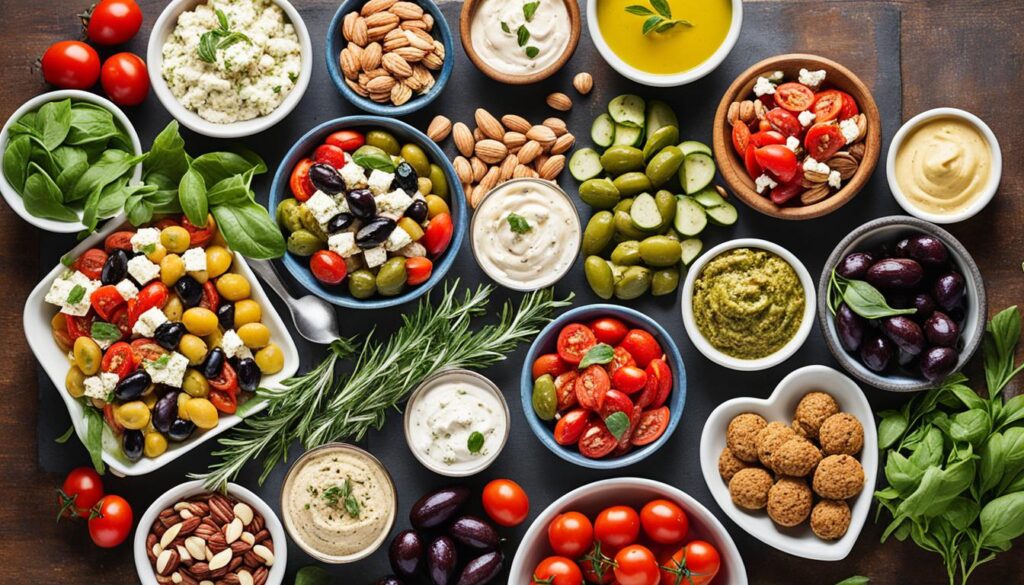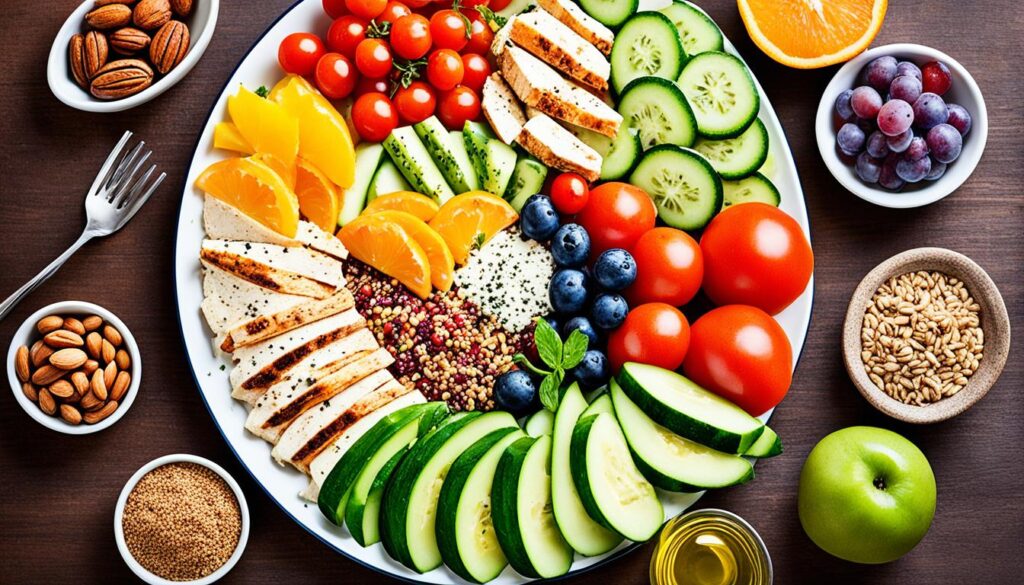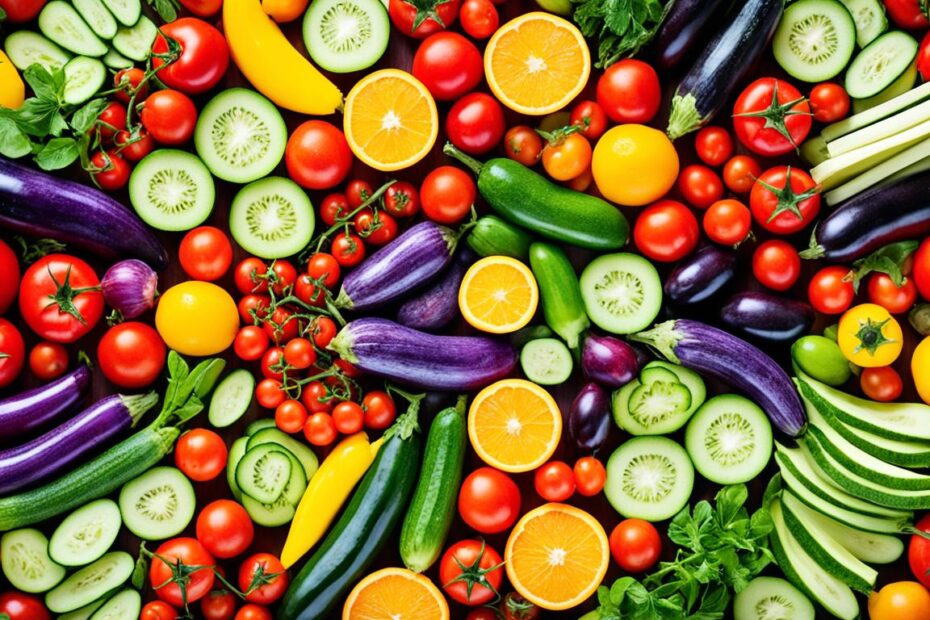Are you curious about the Mediterranean diet’s benefits? You may know it can boost heart health and cut risks of diseases. But starting this diet, what do you eat, and how do you begin?
The Mediterranean diet is based on meals from places like Greece and Spain. You learn about its basics to start, even if you’re far from these places. This diet is all about eating lots of plants, like fruits, vegetables, whole grains, legumes, and nuts. It also includes healthy fish and not so much red meat, chicken, or dairy.
This way of life is not strict but very flexible. It lets you eat in a way that fits you. Adding its ideas to your meals opens up new, tasty, and healthy options for you.
What is the Mediterranean Diet?
The Mediterranean diet comes from countries near the Mediterranean Sea. It’s not just for people in Italy, Spain, or France. Many choose this diet for its healthy perks.
Overview of the Mediterranean Diet
This diet focuses on certain foods but isn’t too strict. It highlights fruits, veggies, grains, and good oils. Instead of lots of meat, you eat more fish. There’s room for some red wine and dairy, but not too much.
It’s often hailed as a top diet by experts, like U.S. News. The American Heart Association also praises it. Studies link it to a lower risk of memory loss later in life.
The Mediterranean diet helps your brain and heart stay healthy. Unlike diets such as paleo or keto, it’s AHA-approved. The DASH diet, too, is good for your health. It suggests a bit more meat and dairy than the Mediterranean.
Experts also support plant-based or vegan eating. These diets aim for quality choices over just any food. Think more veggies and less junk.

Oldways and others share lots about the Mediterranean diet. There are also cookbooks with recipes, like Elena Paravantes’ and budget tips from Emily Cooper, RD.
Benefits of the Mediterranean Diet
The Mediterranean diet is very good for your health. It can lower your cholesterol and reduce heart disease and stroke risks. It also helps prevent Parkinson’s and Alzheimer’s. Recently, it was found to help with depression, anxiety, diabetes type 2, and some cancers, too.
This diet also helps control your weight. People who follow it keep a healthier weight. It lowers the chance of getting metabolic syndrome. This syndrome increases risks for heart disease, stroke, and diabetes type 2.
This diet is all about eating lots of plants, good fats, and less red meat and carbs. Doctors often tell people at risk for heart to eat Mediterranean. It’s proved to keep blood sugar, blood pressure, and cholesterol in check.
It’s also linked to less certain cancers. This might be because of the diet’s many antioxidants and anti-inflammatory foods. Plus, studies show it could slow brain function. This makes it great for staying mentally sharp as you age.
In short, the Mediterranean diet is beneficial. It includes lots of healthy plant foods and good fats. It’s also low in processed and red meats. And, it pairs well with regular exercise for a healthy life.
how to start mediterranean diet
The Mediterranean diet is tasty and good for your health. It gets its influence from countries along the Mediterranean Sea. This diet benefits your heart, helps reduce cancer risk, and makes you feel happier. It’s all about eating in a way that keeps you healthy.
Steps to Incorporate the Mediterranean Diet
Starting the Mediterranean diet is easy. You can slowly add its ideas to your day. Here’s how:
- Revamp your pantry: First, get rid of processed foods. Then, fill it with things like olive oil, whole grains, beans, nuts, and frozen fruits.
- Change your cooking methods: Instead of butter, use olive oil. Enjoy small amounts of tasty cheese instead of lots.
- Reconfigure your plate: Fill half your plate with fruits and veggies. Add one-quarter whole grains and the other quarter with good proteins.
- Eat more mindfully: Enjoy your food with family and friends. Really taste and appreciate what you’re eating.
The Mediterranean diet isn’t strict. It’s about loving whole, natural foods. By making small, lasting changes, you’ll quickly get used to eating this way. You’ll enjoy better health as a result.

This diet is all about choosing fresh, whole foods. It says no to a lot of processed stuff and sugars. Focus on plants, good fats, some lean meats, and dairy. Your body and health will thank you.
Mediterranean Diet Meal Planning
Embracing the Mediterranean diet means liking whole, real foods and moving a lot. When meal planning, aim to match these healthy lifestyle bases. We’ll share tips to make tasty, healthy meals with a Mediterranean twist.
Recipes and Meal Ideas
The Mediterranean diet is mostly plants, with lots of fruits, veggies, whole grains, and good fats. Start by adding colorful fruits and vegetables to half your plate, then add whole grains like brown rice or quinoa. Fill the last quarter with fish, eggs, or legumes for protein.
Use extra virgin olive oil for cooking and drizzling. Cut back on red meat and processed foods. Instead, aim to eat fish and seafood two times a week for their health perks.
For snacks, choose nuts, seeds, or fresh fruit. Or, pick veggies with hummus or Greek yogurt with berries. These options are full of good stuff like vitamins and antioxidants.
Here are some great Mediterranean meal ideas to kick-start your journey:
- Breakfast: Greek yogurt with strawberries and chia seeds
- Lunch: Tuna salad with mixed greens, tomatoes, and a drizzle of olive oil
- Dinner: Baked salmon with roasted vegetables and brown rice
The Mediterranean diet is all about being creative. Try different foods, spices, and ways of cooking to find what you love. Stick to the main guidelines of this way of living to feel good and taste the Mediterranean.
Lifestyle Aspects of the Mediterranean Diet
The Mediterranean diet is more than just food. It’s a way of life. It’s about enjoying meals with family. And savoring every bite. It’s not about eating fast or on the run. Instead, it’s about slowing down and soaking in the flavors and the people sitting with you.
One key thing is the idea of sipping red wine with meals. It’s not about drinking a lot every day. Instead, the diet says to have a little and enjoy it with your food. This shows a smart attitude toward balance and enjoying life.
The use of herbs and spices is also big in this diet. It’s all about making food tasty without too much salt. This way, the food’s real taste shines. Plus, it lets you play around with new tastes. And with a lot of focus on plants, this diet is known for being healthy.
